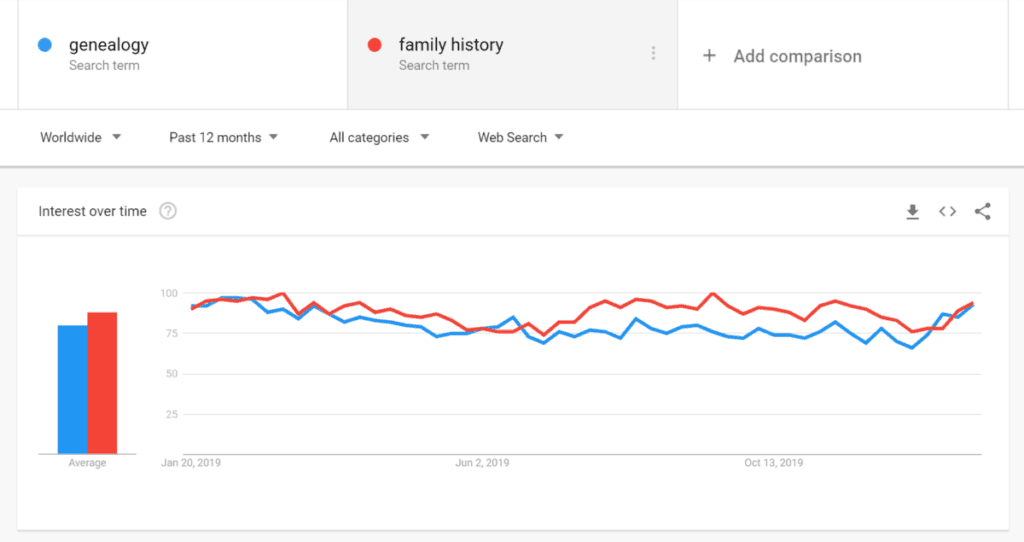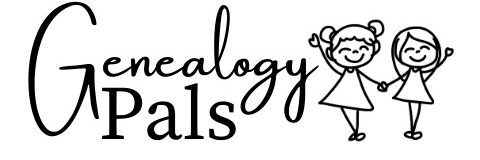Recently, someone asked me what family genealogy was. I stumbled for a moment because I thought the obvious answer had to be the wrong one. So, I texted Breanne to confirm the answer. What is family genealogy?
Family genealogy is the study of your family’s lineage. A family’s genealogy is more limited than general genealogy, though both use the same research practices, resources, and vital statistics. When someone is doing their genealogy, it is implied that they are doing their family’s genealogy.
Ready to understand the semantics? Keep reading and we’ll explain it all – and answer some frequently asked questions, too!

What is Family Genealogy?
Family genealogy is the study of a family’s ancestry, lineage, or lines of descent. It’s a family-specific genealogy. So if you’re doing your family’s genealogy, you’re making charts (or lists) of your parents, their parents, their grandparents, and so on.
It’s also building, researching, and learning the story of your entire family – by also learning the stories of individuals within your family. That includes your own story, by the way!
So when someone says they’re doing their genealogy, they probably mean that they’re doing their family’s genealogy. Unless they’re a professional (or a genealogy geek, like us) who’s helping someone else do their research. Or just researching a random line for fun. Then, they’re doing that family’s genealogy.
In either case, though, it’s a family’s genealogy. However, the word “family” often gets dropped – so that it’s just “genealogy”. And that’s okay. The connection is strongly implied.
No matter the case, though, with family genealogy a genealogist gathers evidence to show the names and relationships of people in the family. A family genealogist will also record dates, places, types of records searched, and where information was finally found. Usually, this information is recorded via a citation to make further research easier.
The Difference Between Genealogy and Family History
Depending on who you ask, there’s either not any difference between the terms “family history” and genealogy – or they’re very different! In general, though, the terms are becoming mostly interchangeable synonyms. At least, to the general public, anyway.
Genealogy and Family History are becoming synonymous. If you check Wikipedia and/or FamilySearch.org’s databases, both terms have been merged and redirected to a single page – that uses “genealogy” as the main search term.
We also did a pretty intense Google trends analysis, looking at genealogy and family history. Check this out:

In other words, the worldwide trend is that these two terms are pretty much the same thing.
Even so, there are a few minor semantic differences between the two words.
Breanne explained it this way to me.
If genealogy and family history were a human body, then:
- Genealogy is the skeleton. It’s building your pedigree, complete with its pedigree charts, direct ancestors, and basic vital statistics.
- Family History is the meat of the bones. It’s the biographical information, complete with personal and family histories, photos, stories, social and historical contexts, and more.
In other words, genealogy and family history are two sides of the same coin. One side is the scientifically minded genealogy that focuses on finding sources. The other side of the coin is the story-centric and biographical-minded family history.
You can do them separately, sure. But when you really look at the details, it’s actually hard to do one without the other. Family history needs genealogy for context and background. And genealogy needs family history to support it with stories that humanize the sheer volume of data.
Both can work individually – but both work so much better when combined.
What is the Difference Between Genealogy and Ancestry?
So if genealogy is the study of your family line, what then is ancestry?
Ancestry is a line of descent. In your case, it’s all of the people whose family relationships came together to result in you being here. Ideally, your ancestral line would have kept the information about each of those family relationships (marriages, births, deaths, etc) so that you’ll know who your family is.
However, much of that information is commonly lost from generation to generation. So if your family doesn’t have all of your genealogy already done, that’s okay. That’s totally normal.
Now you can do genealogy to discover (or rediscover) your ancestry. Genealogy is the key to finding those lost tidbits of knowledge about your family’s lineage.
Pretty cool how they relate, isn’t it?
How Can I Find My Family Genealogy?
To find your family genealogy, you need to start doing your genealogy. But don’t worry – it’s not impossible. Or even hard. It can be as simple as you need it to be.
To start finding your family genealogy (and doing your genealogy), follow these six simple steps.
- Write down the question you want to be answered – or the information you want to find if it isn’t a question.
- Write down what you already know about the desired information or question. This may include asking family members what they know – or what they think they know. Don’t worry – we’ll verify the information later!
- Identify potential and known sources that could answer your question or provide the information you want to find. Commonly used sources include FamilySearch.org, Ancestry.com, vital records, court records, interviews, and other documents now stored (and preserved) online.
- Go through the sources and find your answers!
- Analyze your answers. Are they what you expected? Were you able to find your desired information? If not, you may want to keep looking. If so, go on to step 6.
- Start again with a new question or goal in mind.
These six steps will help you find missing information on your family genealogy so that you can fill in the blanks you’ve been wondering about all this time.
And if you need more help with understanding the six steps to do genealogy? Not a problem. You can read our entire beginner’s guide to starting genealogy here. We go into more detail (with examples) on each of the six steps.
Related Questions
Which Genealogy Test is Best? The best overall DNA-based genealogy test is an atDNA (autosomal DNA) test. Currently, the AncestryDNA test offers the most results with the most potential for matches. Read more about that test, as well as when the other DNA genealogy tests would be more appropriate, in our article on genealogy tests here.
Who Discovered Genealogy? Genealogy does not have an official discovery date or finder, as lineage has been tracked since before written history. To read more about the history, discovery, and meaning of genealogy, read our article on it here.
Is Genealogy a Popular Hobby? Genealogy is a hobby or interest enjoyed by millions of people worldwide. While it is not as widely popular as American Football or even worldwide Football (soccer), it is still a valuable hobby with devoted followers and fans. To see numbers, statistics, and comparisons on genealogy’s popularity, read this article on our site.
Resources
When learning about genealogy, it’s important to learn from various reputable sources. These are the sources used in this article and our research to be more informed as genealogists.
- “Ancestry.” Merriam-Webster, Merriam-Webster, www.merriam-webster.com/dictionary/ancestry.
- Dell, Tony, et al. “What Is the Difference between Genealogy and Family History? • FamilySearch.” FamilySearch Blog, 5 Apr. 2017, www.familysearch.org/blog/en/difference-genealogy-family-history/.
- “Genealogy.” Wikipedia, Wikimedia Foundation, 26 Feb. 2020, en.wikipedia.org/wiki/Genealogy.
- “Genealogy or Family History?” Society of Genealogists, www.sog.org.uk/learn/education-sub-page-for-testing-navigation/guide-ten.
